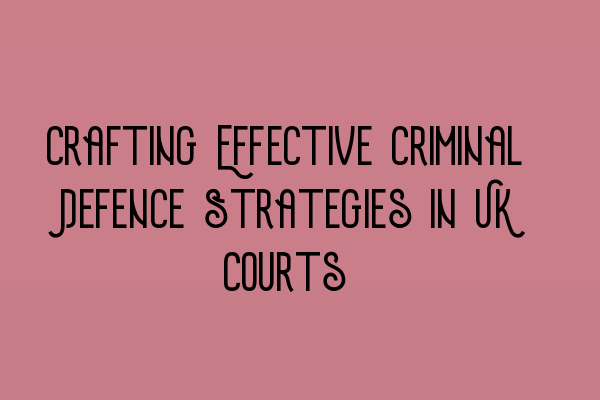Crafting Effective Criminal Defence Strategies in UK Courts
When faced with criminal charges in the UK, it is crucial to have a strong defence strategy to protect your rights and achieve the best possible outcome in court. Crafting an effective criminal defence strategy requires a deep understanding of the law, thorough preparation, and strategic thinking. In this article, we will discuss key elements to consider when developing a defence strategy and provide insights into the process.
1. Comprehensive Case Analysis
The first step in crafting an effective criminal defence strategy is conducting a comprehensive analysis of the case. This involves reviewing all available evidence, witness statements, and any other relevant information. By thoroughly understanding the facts and circumstances surrounding the case, you can identify potential strengths, weaknesses, and opportunities to build a strong defence.
For more information on SQE preparation, you can check out our SQE 1 Practice Exam Questions or SQE 1 Practice Mocks FLK1 FLK2 articles.
2. Legal Research and Analysis
A successful criminal defence strategy relies on a solid understanding of the relevant laws and legal precedents. Conducting thorough legal research and analysis allows you to identify potential defences, arguments, and case laws that can support your position. This step is essential in formulating persuasive legal arguments and anticipating the prosecution’s strategy.
If you are preparing for the SQE exams, our SQE 2 Preparation Courses and SQE 1 Preparation Courses can provide you with the necessary study materials and guidance.
3. Building Evidentiary Support
An effective criminal defence strategy requires strong evidentiary support. This involves collecting and organizing relevant evidence to support your defence. This can include gathering witness testimonies, expert opinions, surveillance footage, or any other evidence that can help challenge the prosecution’s case. Ensuring the admissibility of evidence and presenting it in a compelling manner is key to building a persuasive defence.
4. Witnesses and Expert Testimony
In some cases, witness testimonies and expert opinions can play a crucial role in strengthening your defence strategy. Identifying and preparing witnesses, as well as consulting with experts in relevant fields, can provide valuable insights and strengthen your case. Skilled cross-examination techniques can effectively challenge the prosecution’s witnesses and cast doubt on their credibility.
5. Preparing for Courtroom Tactics
Anticipating the prosecution’s strategy and preparing for courtroom tactics is essential in crafting an effective defence. This includes identifying potential weaknesses in the prosecution’s case, developing effective rebuttals, and being prepared for objections and challenges. By being proactive and prepared, you can effectively respond to the prosecution’s tactics and protect your client’s rights.
To stay updated on the latest SRA SQE exam dates, check out our SRA SQE Exam Dates article.
Conclusion
Crafting an effective criminal defence strategy in UK courts requires careful analysis, thorough preparation, and strategic thinking. By conducting a comprehensive case analysis, conducting legal research, building evidentiary support, utilizing witnesses and expert testimony, and preparing for courtroom tactics, you can develop a strong defence strategy to achieve the best possible outcome for your client. Remember, the assistance of an experienced criminal defence solicitor is invaluable in navigating the complexities of the UK legal system and ensuring your rights are protected.
